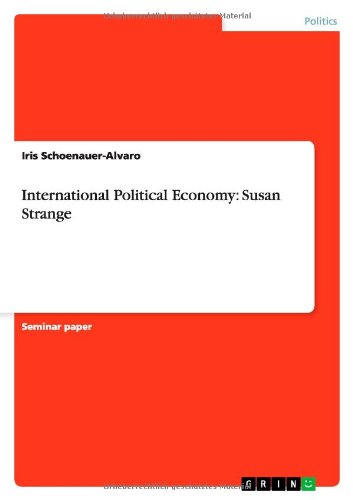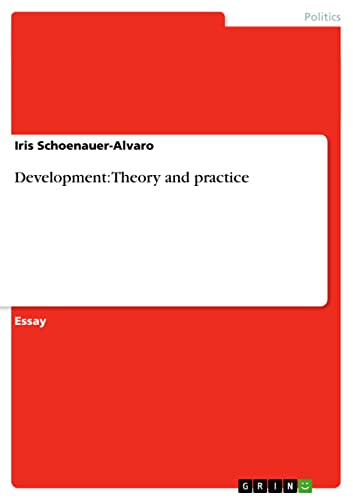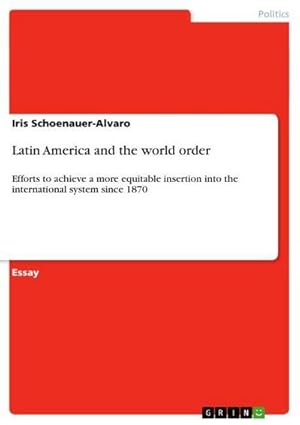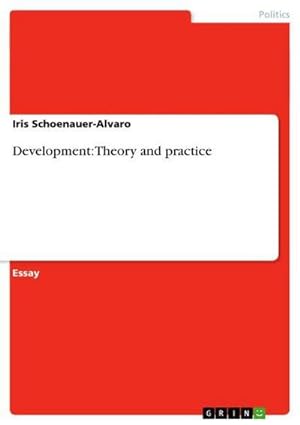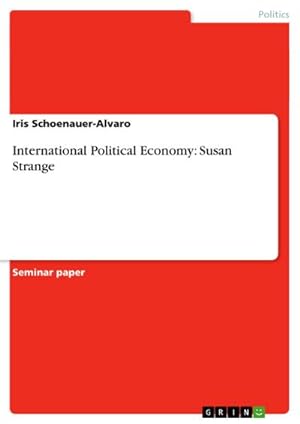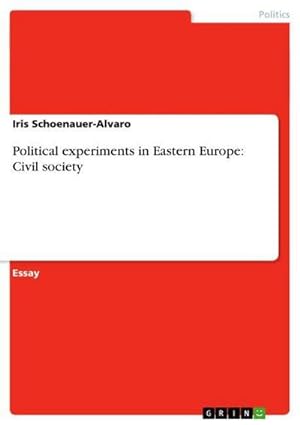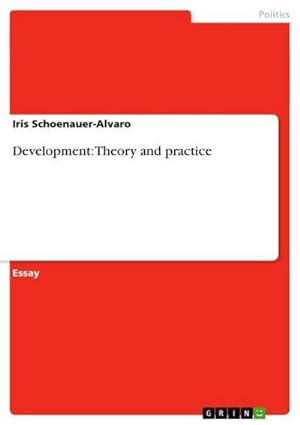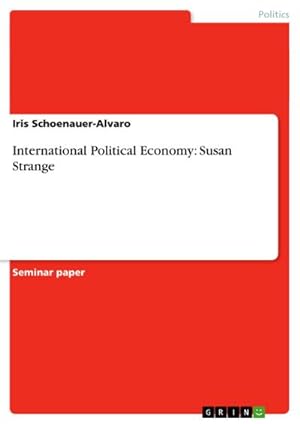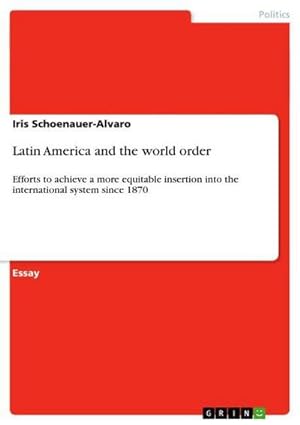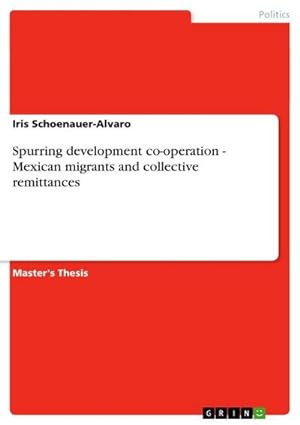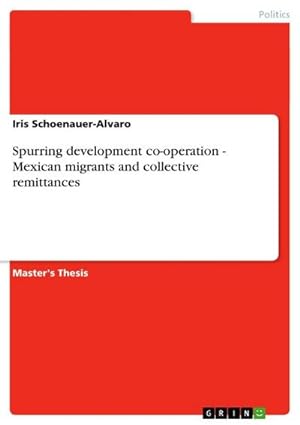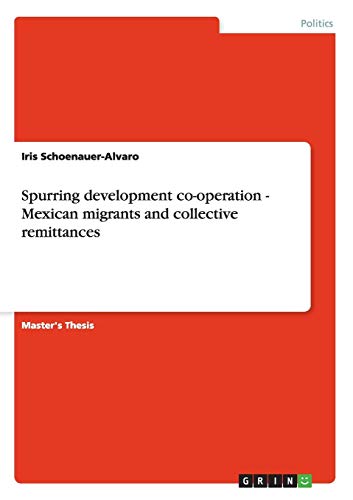Iris Schoenauer Alvaro (15 results)
Product Type
- All Product Types
- Books (15)
- Magazines & Periodicals
- Comics
- Sheet Music
- Art, Prints & Posters
- Photographs
- Maps
-
Manuscripts &
Paper Collectibles
Condition
Binding
- All Bindings
- Hardcover
- Softcover
Collectible Attributes
- First Edition
- Signed
- Dust Jacket
- Seller-Supplied Images (12)
- Not Printed On Demand (9)
Free Shipping
Seller Location
Seller Rating
-
International Political Economy: Susan Strange
Published by GRIN Publishing, 2008
ISBN 10: 3640124987ISBN 13: 9783640124985
Seller: WYEMART LIMITED, HEREFORD, United Kingdom
Book
Paperback. Condition: New. All items inspected and guaranteed. All Orders Dispatched from the UK within one working day. Established business with excellent service record.
-
Development: Theory and practice
Published by Grin Verlag, 2008
ISBN 10: 3640124979ISBN 13: 9783640124978
Seller: California Books, Miami, FL, U.S.A.
Book
Condition: New.
-
Latin America and the world order
Published by GRIN Verlag Aug 2008, 2008
ISBN 10: 3640124995ISBN 13: 9783640124992
Seller: BuchWeltWeit Ludwig Meier e.K., Bergisch Gladbach, Germany
Book Print on Demand
Taschenbuch. Condition: Neu. This item is printed on demand - it takes 3-4 days longer - Neuware -Essay from the year 2003 in the subject Politics - International Politics - Region: Middle- and South America, grade: Honours, Dublin City University, language: English, abstract: More than 510 years after the conquest of Latin America, critical opinions are still voiced with regard to the quality of the subcontinent's insertion into the international system: 'When one begins to see the multiple business connections and interests, it is difficult to avoid concluding that the Plan Puebla Panama (PPP) is more about energy and resource extraction than it is about development'. Arguments along the lines of this PPP critique have been frequently mentioned when discussing topics such as declining terms of trade for raw materials, the unequal access to the world markets, exploitative practices of labour-intense industries, socially detrimental impositions of structural adjustment measures, the increasing hegemony of the United States (US) over Latin America through new free-trade arrangements or projects such as Plan Colombia, and many more.The purpose of this paper is to look beyond plain accusations by assessing the international arena Latin America found itself in since 1870 as well as the efforts made by Latin America to achieve a more equitable insertion into it. Taking into consideration the complexity of the topic, I will only broadly outline earlier attempts while focussing on efforts taken after the Great Depression of 1929. The essay will be organised in four main sections covering the three major phases plus a conclusions section: Primary commodity exports (PCE), import substitution industrialisation (ISI), neo-liberalism (NL), and the conclusions section which will also cover Latin America's prospects. The important aspect of regionalism will be split into 'old regionalism', which will be covered in the ISI section, and 'new regionalism', which falls into the phase of neo-liberalism. 24 pp. Englisch.
-
Development: Theory and practice
Published by GRIN Verlag Aug 2008, 2008
ISBN 10: 3640124979ISBN 13: 9783640124978
Seller: BuchWeltWeit Ludwig Meier e.K., Bergisch Gladbach, Germany
Book Print on Demand
Taschenbuch. Condition: Neu. This item is printed on demand - it takes 3-4 days longer - Neuware -Essay from the year 2003 in the subject Politics - International Politics - Topic: Miscellaneous, grade: Honours, Dublin City University, language: English, abstract: The purpose of this paper is to analyse the development successes and failures of certain countries taking into account whether specific development theories have been applied successfully or not. In order to do so, I will briefly outline the tenets of the main development theories focussing on their constructive aspects without silencing the criticism held against them. Subsequently, I will discuss the different understandings of the term 'development' which will be followed by country-specific analyses of development successes and failures in the light of development theory for which East Asia, Nigeria and Cuba will be used as case studies. Lastly, I will discuss whether reality really proved the predictions of development theory wrong. Generally speaking, the spirit of Peter W. Preston's attitude expressed in his article Development Theory: Learning the Lessons and Moving On1 forges the entire essay.Modernisation theory, the first main development theory of the post-World War II and decolonisation era, clearly reflects Cold War patterns and, as Ronaldo Munck put it, 'was an expression of the then-hegemonic US imperialism' [Kirby: 1997, p. 45]. In the wake of the successful implementation of the Marshall Plan, the rest of the world should also be modernised and, by doing so, convinced to join the capitalist system. The Soviet Union, in turn, applied its 'rubel diplomacy' to support several national liberation movements to get their share of the world. Unfortunately, the idiosyncrasies and special needs of development countries were not taken into consideration. Despite the fact that the modernisation ideas promoted by Durkheim, Weber, Parson, Rostow and McClelland do entail opportunities for general advancement, it is hard to imagine how they should have been compatible with societies predominantly based on a collectively oriented, rural socio-economic structure. Nevertheless, I believe that even today some aspects of this theory could be partly recycled without sacrificing the traditional societal tissue; however, the idea that development can only be guaranteed through industrialisation would need to be discarded. 20 pp. Englisch.
-
International Political Economy: Susan Strange
Published by GRIN Verlag Aug 2008, 2008
ISBN 10: 3640124987ISBN 13: 9783640124985
Seller: BuchWeltWeit Ludwig Meier e.K., Bergisch Gladbach, Germany
Book Print on Demand
Taschenbuch. Condition: Neu. This item is printed on demand - it takes 3-4 days longer - Neuware -Seminar paper from the year 2002 in the subject Politics - International Politics - General and Theories, grade: Honours, Dublin City University, language: English, abstract: This essay will discuss the importance of state and non-state actors in the realms of the international political economy (IPE). In this context, I will explain whether I agree with Susan Strange's statement of 'non-state actors being now more significant than states themselves'. In order to do so, I will briefly look at Susan Strange's underlying arguments focussing, however, on power shifts in general. A succinct definition of what non-state actors are will also be included in this analysis as well as some examples which illustrate changes that have taken place in the world economy. Finally, I will give a conclusive statement as to whether I consider the state to play a less crucial role in today's globalising world. However, I can already mention at this point that I believe that the increasing interconnectedness has had a strong impact on its actors. Notwithstanding, I am convinced that the state is still a vital player whose position is merely being reorganised.Susan Strange argues in her book 'The Erosion of the State' that the state's power has been eroded for example in the following key areas: Firstly, in the finance sector, states no longer have the power to control their own currencies. Secondly, in the welfare sector, states can no longer provide welfare as the burden of additional costs in form of employers' contributions discourages multinational corporations from investing in the economy. 16 pp. Englisch.
-
Mexican hometown associations in the US: Migrants as emerging actors in development
Published by GRIN Verlag Aug 2008, 2008
ISBN 10: 364013043XISBN 13: 9783640130436
Seller: BuchWeltWeit Ludwig Meier e.K., Bergisch Gladbach, Germany
Book Print on Demand
Taschenbuch. Condition: Neu. This item is printed on demand - it takes 3-4 days longer - Neuware -Essay from the year 2003 in the subject Politics - International Politics - Region: Middle- and South America, grade: Honours, Dublin City University, language: English, abstract: Many Latin American governments are more and more interested in obtaining some benefits from the fact that an increasing number of their citizens leave the country in search of better opportunities elsewhere. In the case of Mexico, David Hernández goes as far as to state that President Fox has virtually initiated an 'emigrant hunt' in order to attract valuable foreign exchange.1 Looking at it from a migrant's perspective, there has been a long tradition of maintaining families back home by means of remittances. Within this context of remittances, a new phenomenon has emerged during the last decade: Collective remittances for development projects, which are co-financed by migrant communities and the home state. The purpose of this paper is to analyse the role Mexican Hometown Associations (HTAs) in the United States (US) play in terms of Mexico's communal or regional development; by doing so, I will focus on the issue of collective remittances. Firstly, I will look at the purpose of Mexican HTAs and how they evolved over time; this will be followed by an analysis of the role of the Mexican government in establishing and maintaining contacts with HTAs and in performing joint projects such as fund-matching schemes for developmental purposes. Subsequently, I will analyse a case study that exemplifies such a fund-matching scheme: the 'three-for-one' project of the Mexican state of Zacatecas. Lastly, I will examine the potential of transnational social movements in general and HTAs in particular with regard to the social, economic and political development of their home countries. 24 pp. Englisch.
-
Political experiments in Eastern Europe: Civil society
Published by GRIN Verlag Aug 2008, 2008
ISBN 10: 3640130421ISBN 13: 9783640130429
Seller: BuchWeltWeit Ludwig Meier e.K., Bergisch Gladbach, Germany
Book Print on Demand
Taschenbuch. Condition: Neu. This item is printed on demand - it takes 3-4 days longer - Neuware -Essay from the year 2003 in the subject Politics - International Politics - Region: Eastern Europe, grade: Honours, Dublin City University, language: English, abstract: Despite the fact that during the recent Hungarian plebiscite regarding the country's accession to the European Union (EU) 83.76 per cent of the votes were in favour of joining the EU, the low election turnout of only 44.13 per cent of all Hungarians entitled to vote was considered 'shameful'; an important political and economic decision has been taken with the official approval of only two fifth of the eight million Hungarians with voting rights.1 This and other somewhat disappointing examples raise the question of how committed Eastern Europeans are in terms of forging their own post-communist future. This paper will attempt to analyse the role civil society has played in the democratisation process of the region since 1989. As effects can generally only be properly assessed with a mid- or even long-term perspective, looking at isolated events, which took place during the last slightly more than thirteen years, does not suffice to come to a reliable conclusion about the strength or weakness of civil society. For this reason, I will focus in my analysis on tendencies and their possible historical explanation; where possible, survey data will be provided which should facilitate a broader understanding of current trends. Since - due to the individual countries' very distinct historical characteristics - in many instances it does not seem appropriate to evaluate 'Eastern European civil societies' as a whole, I will adopt Attila Ágh's model differentiating at times between 'East Central European (ECE) civil society' (Poland, Czech Republic, Slovakia, Hungary, Slovenia, Croatia) and 'the Balkans civil society' (Bulgaria, Romania, Serbia, Macedonia, Albania, Bosnia) taking into consideration regional similarities (Ágh, 1998: 5). The structure of this paper will be as follows: Firstly, I will look at the concepts of civil society in general, post-communist civil society in particular as well as democratisation in Eastern Europe. This will be followed by an examination of two areas, which tend to be closely associated with civil society: the strength of civic associations in terms of density and intensity as well as the relationship between civic associations and political institutions; the second area includes an evaluation of the concept of trust. Lastly, I will offer a general judgement as to whether I think that the civil society of the region can rightly be considered 'the great disappointment of post-communist democratisation'. 24 pp. Englisch.
-
Development: Theory and practice
Published by GRIN Verlag, 2008
ISBN 10: 3640124979ISBN 13: 9783640124978
Seller: AHA-BUCH GmbH, Einbeck, Germany
Book
Taschenbuch. Condition: Neu. Druck auf Anfrage Neuware - Printed after ordering - Essay from the year 2003 in the subject Politics - International Politics - Topic: Miscellaneous, grade: Honours, Dublin City University, language: English, abstract: The purpose of this paper is to analyse the development successes and failures of certain countries taking into account whether specific development theories have been applied successfully or not. In order to do so, I will briefly outline the tenets of the main development theories focussing on their constructive aspects without silencing the criticism held against them. Subsequently, I will discuss the different understandings of the term 'development' which will be followed by country-specific analyses of development successes and failures in the light of development theory for which East Asia, Nigeria and Cuba will be used as case studies. Lastly, I will discuss whether reality really proved the predictions of development theory wrong. Generally speaking, the spirit of Peter W. Preston's attitude expressed in his article Development Theory: Learning the Lessons and Moving On1 forges the entire essay.Modernisation theory, the first main development theory of the post-World War II and decolonisation era, clearly reflects Cold War patterns and, as Ronaldo Munck put it, 'was an expression of the then-hegemonic US imperialism' [Kirby: 1997, p. 45]. In the wake of the successful implementation of the Marshall Plan, the rest of the world should also be modernised and, by doing so, convinced to join the capitalist system. The Soviet Union, in turn, applied its 'rubel diplomacy' to support several national liberation movements to get their share of the world. Unfortunately, the idiosyncrasies and special needs of development countries were not taken into consideration. Despite the fact that the modernisation ideas promoted by Durkheim, Weber, Parson, Rostow and McClelland do entail opportunities for general advancement, it is hard to imagine how they should have been compatible with societies predominantly based on a collectively oriented, rural socio-economic structure. Nevertheless, I believe that even today some aspects of this theory could be partly recycled without sacrificing the traditional societal tissue; however, the idea that development can only be guaranteed through industrialisation would need to be discarded.
-
International Political Economy: Susan Strange
Published by GRIN Verlag, 2008
ISBN 10: 3640124987ISBN 13: 9783640124985
Seller: AHA-BUCH GmbH, Einbeck, Germany
Book
Taschenbuch. Condition: Neu. Druck auf Anfrage Neuware - Printed after ordering - Seminar paper from the year 2002 in the subject Politics - International Politics - General and Theories, grade: Honours, Dublin City University, language: English, abstract: This essay will discuss the importance of state and non-state actors in the realms of the international political economy (IPE). In this context, I will explain whether I agree with Susan Strange's statement of 'non-state actors being now more significant than states themselves'. In order to do so, I will briefly look at Susan Strange's underlying arguments focussing, however, on power shifts in general. A succinct definition of what non-state actors are will also be included in this analysis as well as some examples which illustrate changes that have taken place in the world economy. Finally, I will give a conclusive statement as to whether I consider the state to play a less crucial role in today's globalising world. However, I can already mention at this point that I believe that the increasing interconnectedness has had a strong impact on its actors. Notwithstanding, I am convinced that the state is still a vital player whose position is merely being reorganised.Susan Strange argues in her book 'The Erosion of the State' that the state's power has been eroded for example in the following key areas: Firstly, in the finance sector, states no longer have the power to control their own currencies. Secondly, in the welfare sector, states can no longer provide welfare as the burden of additional costs in form of employers' contributions discourages multinational corporations from investing in the economy.
-
Mexican hometown associations in the US: Migrants as emerging actors in development
Published by GRIN Verlag, 2008
ISBN 10: 364013043XISBN 13: 9783640130436
Seller: AHA-BUCH GmbH, Einbeck, Germany
Book
Taschenbuch. Condition: Neu. Druck auf Anfrage Neuware - Printed after ordering - Essay from the year 2003 in the subject Politics - International Politics - Region: Middle- and South America, grade: Honours, Dublin City University, language: English, abstract: Many Latin American governments are more and more interested in obtaining some benefits from the fact that an increasing number of their citizens leave the country in search of better opportunities elsewhere. In the case of Mexico, David Hernández goes as far as to state that President Fox has virtually initiated an 'emigrant hunt' in order to attract valuable foreign exchange.1 Looking at it from a migrant's perspective, there has been a long tradition of maintaining families back home by means of remittances. Within this context of remittances, a new phenomenon has emerged during the last decade: Collective remittances for development projects, which are co-financed by migrant communities and the home state. The purpose of this paper is to analyse the role Mexican Hometown Associations (HTAs) in the United States (US) play in terms of Mexico's communal or regional development; by doing so, I will focus on the issue of collective remittances. Firstly, I will look at the purpose of Mexican HTAs and how they evolved over time; this will be followed by an analysis of the role of the Mexican government in establishing and maintaining contacts with HTAs and in performing joint projects such as fund-matching schemes for developmental purposes. Subsequently, I will analyse a case study that exemplifies such a fund-matching scheme: the 'three-for-one' project of the Mexican state of Zacatecas. Lastly, I will examine the potential of transnational social movements in general and HTAs in particular with regard to the social, economic and political development of their home countries.
-
Latin America and the world order : Efforts to achieve a more equitable insertion into the international system since 1870
Published by GRIN Verlag, 2008
ISBN 10: 3640124995ISBN 13: 9783640124992
Seller: AHA-BUCH GmbH, Einbeck, Germany
Book
Taschenbuch. Condition: Neu. Druck auf Anfrage Neuware - Printed after ordering - Essay from the year 2003 in the subject Politics - International Politics - Region: Middle- and South America, grade: Honours, Dublin City University, language: English, abstract: More than 510 years after the conquest of Latin America, critical opinions are still voiced with regard to the quality of the subcontinent's insertion into the international system: 'When one begins to see the multiple business connections and interests, it is difficult to avoid concluding that the Plan Puebla Panama (PPP) is more about energy and resource extraction than it is about development'. Arguments along the lines of this PPP critique have been frequently mentioned when discussing topics such as declining terms of trade for raw materials, the unequal access to the world markets, exploitative practices of labour-intense industries, socially detrimental impositions of structural adjustment measures, the increasing hegemony of the United States (US) over Latin America through new free-trade arrangements or projects such as Plan Colombia, and many more.The purpose of this paper is to look beyond plain accusations by assessing the international arena Latin America found itself in since 1870 as well as the efforts made by Latin America to achieve a more equitable insertion into it. Taking into consideration the complexity of the topic, I will only broadly outline earlier attempts while focussing on efforts taken after the Great Depression of 1929. The essay will be organised in four main sections covering the three major phases plus a conclusions section: Primary commodity exports (PCE), import substitution industrialisation (ISI), neo-liberalism (NL), and the conclusions section which will also cover Latin America's prospects. The important aspect of regionalism will be split into 'old regionalism', which will be covered in the ISI section, and 'new regionalism', which falls into the phase of neo-liberalism.
-
Political experiments in Eastern Europe: Civil society
Published by GRIN Verlag, 2008
ISBN 10: 3640130421ISBN 13: 9783640130429
Seller: AHA-BUCH GmbH, Einbeck, Germany
Book
Taschenbuch. Condition: Neu. Druck auf Anfrage Neuware - Printed after ordering - Essay from the year 2003 in the subject Politics - International Politics - Region: Eastern Europe, grade: Honours, Dublin City University, language: English, abstract: Despite the fact that during the recent Hungarian plebiscite regarding the country's accession to the European Union (EU) 83.76 per cent of the votes were in favour of joining the EU, the low election turnout of only 44.13 per cent of all Hungarians entitled to vote was considered 'shameful'; an important political and economic decision has been taken with the official approval of only two fifth of the eight million Hungarians with voting rights.1 This and other somewhat disappointing examples raise the question of how committed Eastern Europeans are in terms of forging their own post-communist future. This paper will attempt to analyse the role civil society has played in the democratisation process of the region since 1989. As effects can generally only be properly assessed with a mid- or even long-term perspective, looking at isolated events, which took place during the last slightly more than thirteen years, does not suffice to come to a reliable conclusion about the strength or weakness of civil society. For this reason, I will focus in my analysis on tendencies and their possible historical explanation; where possible, survey data will be provided which should facilitate a broader understanding of current trends. Since - due to the individual countries' very distinct historical characteristics - in many instances it does not seem appropriate to evaluate 'Eastern European civil societies' as a whole, I will adopt Attila Ágh's model differentiating at times between 'East Central European (ECE) civil society' (Poland, Czech Republic, Slovakia, Hungary, Slovenia, Croatia) and 'the Balkans civil society' (Bulgaria, Romania, Serbia, Macedonia, Albania, Bosnia) taking into consideration regional similarities (Ágh, 1998: 5). The structure of this paper will be as follows: Firstly, I will look at the concepts of civil society in general, post-communist civil society in particular as well as democratisation in Eastern Europe. This will be followed by an examination of two areas, which tend to be closely associated with civil society: the strength of civic associations in terms of density and intensity as well as the relationship between civic associations and political institutions; the second area includes an evaluation of the concept of trust. Lastly, I will offer a general judgement as to whether I think that the civil society of the region can rightly be considered 'the great disappointment of post-communist democratisation'.
-
Spurring development co-operation - Mexican migrants and collective remittances
Published by GRIN Verlag Aug 2008, 2008
ISBN 10: 3640134559ISBN 13: 9783640134557
Seller: BuchWeltWeit Ludwig Meier e.K., Bergisch Gladbach, Germany
Book Print on Demand
Taschenbuch. Condition: Neu. This item is printed on demand - it takes 3-4 days longer - Neuware -Master's Thesis from the year 2003 in the subject Politics - International Politics - Region: Middle- and South America, grade: Honours, Dublin City University, 75 entries in the bibliography, language: English, abstract: In times of rising inequality levels coupled with the fact that many governments of the developing world fail to provide even the most basic public services to their citizens and that neither aid nor trade have so far succeeded in spreading wealth more evenly across the globe, complementary innovative approaches need to be devised that benefit ordinary people.A myriad of root causes have resulted in ever-increasing international migration and, thus, in rising flows of remittances, which have already overtaken the worldwide amount of official development assistance. Whereas family remittances tend to be part of the recipient's survival strategy, collective remittances may aim at regional development. Yet not only due to their rather modest share of total remittances but also because of the complexities of regional development itself, collective remittances will certainly not be a 'magic wand'. They may,however, make a potentially far-reaching contribution both with regard to low-scale development and popular participation.This dissertation explores so-called 'fund-matching schemes' in which the Mexican government provides additional financial resources for each dollar remitted by migrants as collective remittances. The increased pool of resources enables the implementation of a larger number of projects or of more resource-intense projects for which the improvement of the local infrastructure and human development are currently prioritised. Furthermore, an interesting co-operation between migrants and the state emerges, which - although it showssome remnants of a traditionally authoritarian regime and isolated little cooperative attitudes among migrants - may positively influence Mexico's 92 pp. Englisch.
-
Spurring development co-operation - Mexican migrants and collective remittances
Published by GRIN Verlag, 2008
ISBN 10: 3640134559ISBN 13: 9783640134557
Seller: AHA-BUCH GmbH, Einbeck, Germany
Book
Taschenbuch. Condition: Neu. Druck auf Anfrage Neuware - Printed after ordering - Master's Thesis from the year 2003 in the subject Politics - International Politics - Region: Middle- and South America, grade: Honours, Dublin City University, 75 entries in the bibliography, language: English, abstract: In times of rising inequality levels coupled with the fact that many governments of the developing world fail to provide even the most basic public services to their citizens and that neither aid nor trade have so far succeeded in spreading wealth more evenly across the globe, complementary innovative approaches need to be devised that benefit ordinary people.A myriad of root causes have resulted in ever-increasing international migration and, thus, in rising flows of remittances, which have already overtaken the worldwide amount of official development assistance. Whereas family remittances tend to be part of the recipient's survival strategy, collective remittances may aim at regional development. Yet not only due to their rather modest share of total remittances but also because of the complexities of regional development itself, collective remittances will certainly not be a 'magic wand'. They may,however, make a potentially far-reaching contribution both with regard to low-scale development and popular participation.This dissertation explores so-called 'fund-matching schemes' in which the Mexican government provides additional financial resources for each dollar remitted by migrants as collective remittances. The increased pool of resources enables the implementation of a larger number of projects or of more resource-intense projects for which the improvement of the local infrastructure and human development are currently prioritised. Furthermore, an interesting co-operation between migrants and the state emerges, which - although it showssome remnants of a traditionally authoritarian regime and isolated little cooperative attitudes among migrants - may positively influence Mexico's.
-
Spurring development co-operation - Mexican migrants and collective remittances
Published by GRIN Verlag, 2008
ISBN 10: 3640134559ISBN 13: 9783640134557
Seller: dsmbooks, Liverpool, United Kingdom
Book
Paperback. Condition: Like New. Like New. book.


